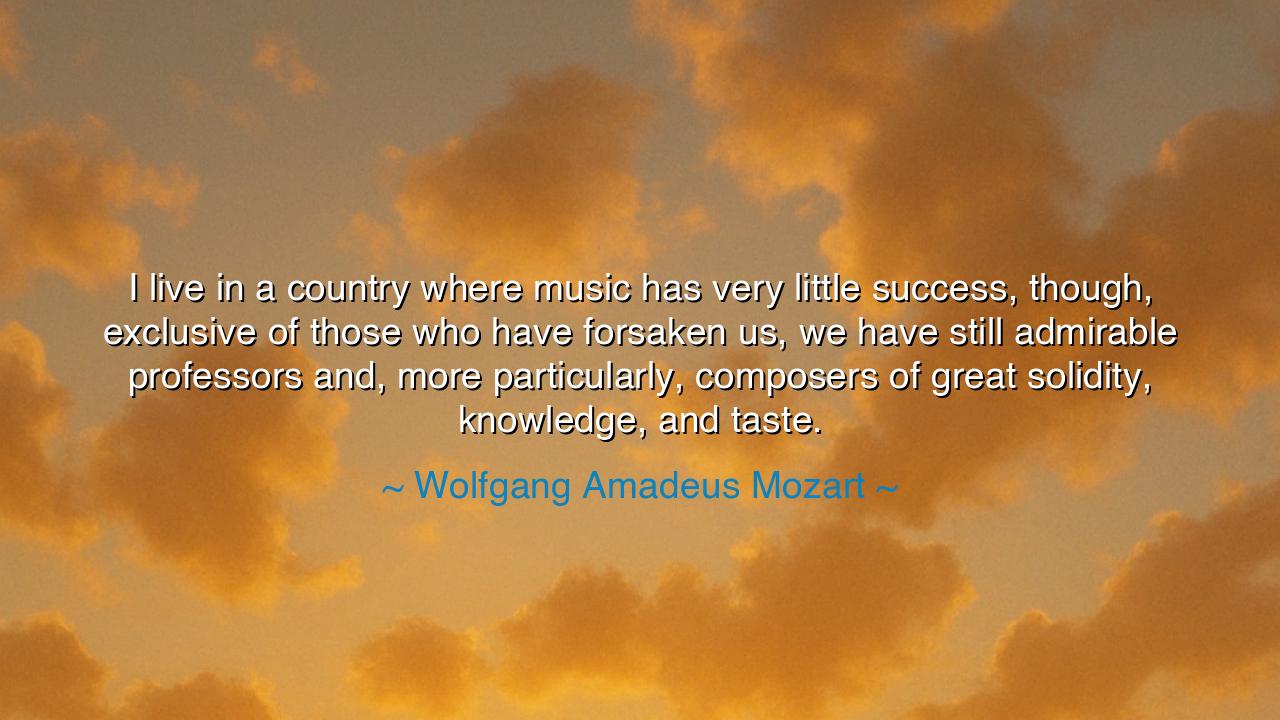
I live in a country where music has very little success, though
I live in a country where music has very little success, though, exclusive of those who have forsaken us, we have still admirable professors and, more particularly, composers of great solidity, knowledge, and taste.






Hear, O seekers of harmony and truth, the lament of Wolfgang Amadeus Mozart, who once declared: “I live in a country where music has very little success, though, exclusive of those who have forsaken us, we have still admirable professors and, more particularly, composers of great solidity, knowledge, and taste.” In this sorrowful confession lies the paradox of genius: that even in lands where brilliance dwells, the people may fail to honor it; that the purest streams of art may flow unheeded, while shallow waters are praised by the multitude.
Mozart, the master whose notes still resound across centuries, spoke these words while struggling for recognition in his own homeland. Though his works were filled with fire and beauty, he lived in a country where patronage was fickle, audiences indifferent, and envy fierce. He looked about and saw fellow composers, men of learning and taste, yet saw also how society failed to nourish their gifts. The tragedy he named was not the absence of talent, but the absence of support—the neglect of a treasure present in abundance.
Consider how often in history this fate has befallen the gifted. Recall Vincent van Gogh, who painted with colors of eternity, yet in his lifetime sold almost nothing. He lived in a world that did not yet see the radiance of his vision. So too with Mozart: though his music stirred heaven itself, he struggled in his daily life, lamenting that music in his land found “little success.” Thus, the words of his letter are not complaint alone, but testimony to the eternal struggle between genius and recognition.
And yet, in his lament, Mozart honored his fellow professors and composers—those of solidity and knowledge, who persisted despite neglect. He understood that the greatness of art does not depend upon applause, but upon integrity, mastery, and taste. He admired those who remained faithful to their craft even when fortune turned its face. Here lies a noble lesson: success measured by the crowd is fleeting, but success measured by devotion to truth and beauty is eternal.
The meaning of this quote is therefore twofold. On one hand, it is a cry against the blindness of society, which often fails to cherish its artists until they are gone. On the other, it is a tribute to the strength and resilience of those who labor in obscurity, holding fast to their art as to a sacred trust. Mozart himself, though troubled by neglect, never ceased to compose, for he knew that music itself was his calling, regardless of whether his contemporaries understood.
The lesson, O listener, is clear: do not measure your worth by the fickle scales of worldly success. If you are a creator, a teacher, a seeker of truth, be steadfast, even if your generation does not yet see your value. And if you are among the audience of life, learn to honor those whose gifts shine before you—lest you, too, forsake the Mozarts of your own time.
Practical action lies before you: support the arts, honor the teachers, uplift those whose knowledge and taste enrich your community, even if they are not celebrated by the masses. Seek out not only what is popular, but what is excellent. And if your calling is to create, remain faithful to it, knowing that applause is fleeting, but truth endures.
Thus remember Mozart’s words: the land may neglect its artists, the age may misunderstand them, but the greatness of their work shall not be lost. For music—and all true art—does not depend on the applause of its own day, but on the eternal echo it leaves in the soul of humanity.






AAdministratorAdministrator
Welcome, honored guests. Please leave a comment, we will respond soon